The March Back to Athens
The Athenians had won a stunning victory. Despite being outnumbered two to one, their strength, bravery, better arms, and superb battle formations had won the day. And yet it was not all over. Most of the Persians had escaped by ship. Only 7 triremes had been captured, and the rest were heading south west. Clearly they were going to try to reach Athens and take it undefended.
The hoplites must have been utterly exhausted. Still, the generals had no choice but to get them organised and march them as fast as their weary legs would carry them back to Athens - 26 miles. This march is perhaps what we should be celebrating in the modern marathon race.
The army arrived at Athens in the night, stopping in Kynosarges - another sanctuary of Herakles, with an attached gymnasium. The shattered soldiers rested. In the morning the Persian fleet arrived. They saw the Athenian army had beaten them to it, and left.
King Darius cannot have been pleased. It would be another ten years, however, before the Persians came back - this time with a much bigger army, and now led by the new king, Darius' son Xerxes. But that's another story.
The Dead
One of the ten tribes was left at Marathon to look after the wounded and dead, and guard the captured Persian loot. The number of dead was finally counted, and the result was amazing. According to Herodotus, 6,400 Persians were killed. And how many Athenians lost their lives? Only 192. Eleven Plataians also died.
In fact so many Persians had been killed that the Athenians could not keep their promise to Artemis, and instead sacrificed 500 goats every year.
A marble column was raised at the turning point of the battle - see the replica below. The 192 dead were not taken back to Athens, as was the usual custom, but cremated and buried in a special mound, or soros, near the battlefield. You can still see the soros today - see the picture below. It was 50m wide and 9m high. When I visited it I had a feeling of awe and reverence which I had never felt before.
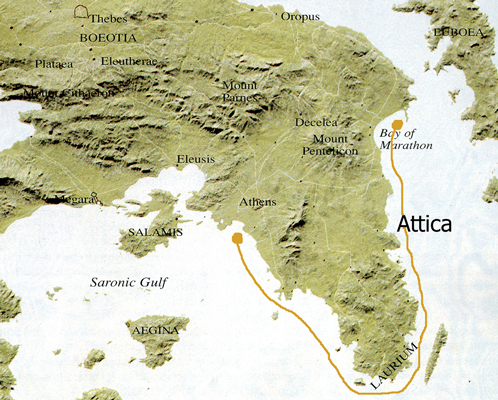
The route taken by the Persian fleet after the battle.
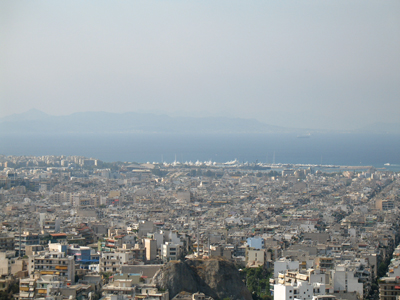
The view of the sea from a hill in Athens. Imagine the 600 ships arriving.
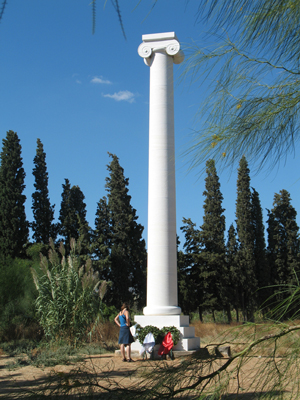
Copy of the trophy raised by the Athenians
Commemorations
Of course the Athenians were overjoyed to have beaten the Persians and saved their families, homes, and temples. The battle was celebrated in many ways: ten marble columns with the names of the dead were placed around the Soros; sacrifices were made; songs were written (Aeschylus wrote an elegy about Marathon); a shrine to Pan was built; a temple to Glory was consecrated; and many statues and other carvings were made. The Marathon warriors were given heroic honours and remembered for hundreds of years after.
The poet Aeschylus, who was in the battle, went on to be the first great playwright in history. He wrote over 80 plays and was famous throughout the known world - and yet when he died, 34 years after Marathon, his tombstone said nothing of his plays. This is what it said:
Aeschylus the Athenian, Euphorion's son, is dead. This tomb in Gela's cornlands covers him. His glorious courage the hallowed field of Marathon could tell, and the longhaired Persian had knowledge of it.
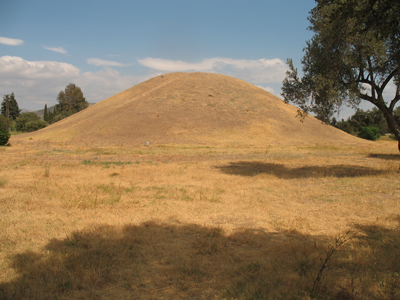
The Soros - burial mound of the Athenians who died at Marathon
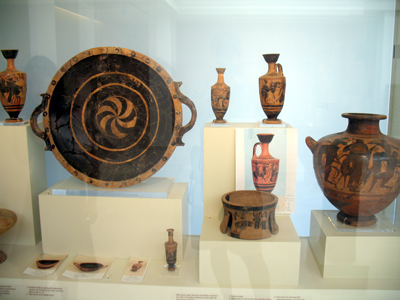
Offerings found in the Soros
What about the Spartans?
The Spartan army finally did arrive, one day after the battle. They were curious and went to the battlefield to see for themselves the astonishing victory.
They made up for being late ten years later at Thermopylae. Which is an even more amazing story.
The Importance of Marathon
The English philosopher John Stuart Mill once wrote that Marathon was the most important battle in British history - even though it took place in Greece, and no Briton was involved. Why did he say that? Well, consider this: what would have happened if the Persians had won at Marathon.
There is no way to know. But it is possible that they would have established a firm footing in Greece, and brought reinforcements. With a larger army they might have gone on to defeat the Spartans, and then the whole of Greece. So what?
We in the west - Europe, the USA, Australia, Canada, and many other parts of the world - owe a great deal to the Greeks. So much of our civilisation comes from them it is hard to imagine life today without their legacy. Our language, democracy, philosophy, mathematics, history, theatre, some of our most beloved architecture, many of our basic ideas about science, and much more, were given to us by the Greeks - above all by the Athenians.
So if the Persians had won at Marathon - how different might our lives be today?

The White House, USA - with Greek Ionic columns (Washington DC is filled with Greek architecture).

The theatre at Delphi